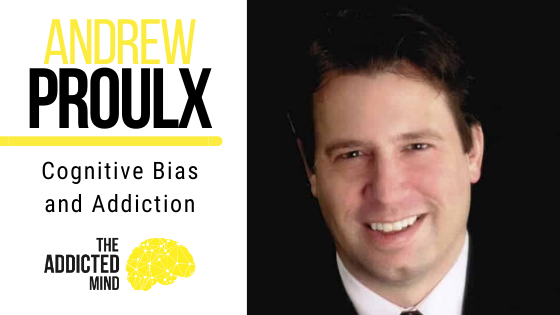On today’s episode of The Addicted Mind Podcast, Duane talks with Andrew Proulx about the concept of cognitive bias and how this process works in the middle of addiction. Andrew also talks about his own journey with addiction in light cognitive bias.
Alongside his medical practice, Andrew ran a psychotherapy practice for 15 years before becoming addicted to alcohol and opiates. After hitting rock bottom, Andrew’s friends brought him to a 12-step program and a light went off that allowed for him. Being able to see that other people were able to get themselves out of the pit was huge. It’s crucial to understand that there’s nothing wrong with you, but that the symptoms of addiction are common.
Cognitive bias, or our natural inclination to make information match what we already believe, was the research focus for Andrew for many years. He found that people with addictions distort information to the extremes using a very intense form of cognitive bias. In other words, addiction amplifies the effects of cognitive bias.
Being able to recognize cognitive bias at all can help the addict, because it challenges you to think about the way that you’re thinking: metacognition or plain mindfulness. People ultimately want to know the why; they want to know why they think the way they do, and why their brain works the way it does
Andrew encourages people to be open-minded, which he recognizes is difficult. Creating a list of feedback from other people can help to defeat cognitive bias. The empty chair technique works to try to visualize the situation if you don’t have someone in arm’s reach to offer feedback. There are techniques you can actually use to challenge your cognitive biases, which can help you to overcome your addiction.
Andrew wants everyone to know that all are capable of a lasting recovery if they only accept the help that is out there.
Andrew breaks down three prominent forms of cognitive bias that
- The attentional bias, or the bias that’s attached to our attention.
- The optimism bias, where we cling to the belief that things will end up okay, despite all evidence pointing to your own destruction.
- The recall bias, in which the addict recalls what they want to believe. They forget the bad stuff and recall the bad days as something rosy-glassed.
You can support the Addicted Mind Podcast by purchasing through our affiliate links.
Above are affiliate links, this means that if you purchase something, The Addicted Mind Podcast will earn a commission. This commission does not cost you anything. This commission helps offset the cost of running The Addicted Mind Podcast and enables me to continue to create meaningful and helpful content. Thank you for your continued support.



